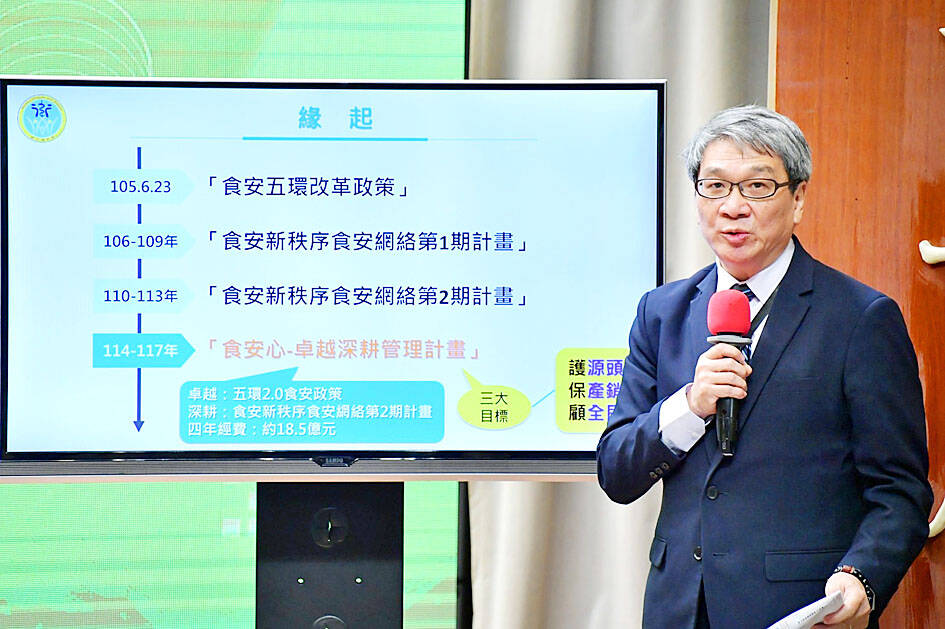The Ministry of Health and Welfare yesterday announced that it would spend NT$1.85 billion (US$57.66 million) over the next four years on improving food safety, most notably by expanding the use of artificial intelligence (AI).
The ministry at a Cabinet meeting briefed Premier Cho Jung-tai (卓榮泰) on its AI-enhanced food safety plans focusing on three key areas: food source risk management, chain of custody certification and community monitoring.
The Executive Yuan approved the new food safety management plan in August, the ministry said.

Photo courtesy of the Executive Yuan
Food safety is central to the government’s agenda, Cabinet spokeswoman Michelle Lee (李慧芝) quoted Cho as saying during the meeting, as he urged the ministry to carefully carry out the initiative.
The plan requires a budget increase of about 73 percent from NT$186.2 million this year to NT$321.4 million next year, a NT$135.1 million difference, Lee cited Cho as saying.
The policy is part of a broader agenda termed the “five strikes and seven safeties,” which refer to five types of crime — organized, financial, gun, drug and fraud — the government wants to tackle, and seven safety issues — public, food, road, occupational, school, housing and cybersecurity — that the ministry is to uphold, she said.
The project uses AI and digital technology to promote four key tasks: export development; improved management of specific industries such as cold chain storage; monitoring of heavy metals in food products; and analysis of international food advertising regulations, the ministry said.
AI would also be used to optimize risk management and early warning mechanisms for food safety incidents, in addition to providing services for the public and regulating food advertisements, it said.
The Food and Drug Administration (FDA) said it would continue to improve its food safety management policies, including enhancing cooperation with local officials on food inspections, increasing its capacity for inspections, refining management of imported food sources and expanding its international food risk alert monitoring.
The FDA said it would also coordinate cross-ministerial inspections to support digital initiatives, and reinforce food safety and hygiene precautions.

Chinese spouse and influencer Guan Guan’s (關關) residency permit has been revoked for repeatedly posting pro-China videos that threaten national security, the National Immigration Agency confirmed today. Guan Guan has said many controversial statements in her videos posted to Douyin (抖音), including “the red flag will soon be painted all over Taiwan” and “Taiwan is an inseparable part of China,” and expressing hope for expedited reunification. The agency last year received multiple reports alleging that Guan Guan had advocated for armed reunification. After verifying the reports, the agency last month issued a notice requiring her to appear and explain her actions. Guan

The Kaohsiung Tourism Bureau audited six hotels in an effort to prevent price gouging ahead of Korean band BTS’ concert tour in the city scheduled for Nov. 19, 21 and 22 this year. The bureau on Friday said that the audits — conducted in response to allegations of unfair pricing posted on social media — found no wrongdoing. These establishments included the local branches of Chateau de Chine, Hotel Nikko, My Humble House, and Grand Hai Lai, it said, adding that the Consumer Protection Commission would have penalized price gougers had the accusations been substantiated. The bureau said the Tourism Development Act

BACK TO WINTER: A strong continental cold air mass would move south on Tuesday next week, bringing colder temperatures to northern and central Taiwan A tropical depression east of the Philippines could soon be upgraded to be the first tropical storm of this year, the Central Weather Administration (CWA) said yesterday, adding that the next cold air mass is forecast to arrive on Monday next week. CWA forecaster Cheng Jie-ren (鄭傑仁) said the first tropical depression of this year is over waters east of the Philippines, about 1,867km southeast of Oluanpi (鵝鑾鼻), and could strengthen into Tropical Storm Nokaen by early today. The system is moving slowly from northwest to north, and is expected to remain east of the Philippines with little chance of affecting Taiwan,

The military yesterday said it has located the flight data recorder, or black box, of an F-16V jet that disappeared off eastern Taiwan earlier this month, and it would soon deploy a salvage team to try to retrieve it. Air Force Command Headquarters said that while it had pinned down the location of the black box, it was still searching for the aircraft’s sole pilot, air force Captain Hsin Po-yi (辛柏毅). Without providing details, the air force said it had located the black box days after detecting some intermittent signals and would now engage a team of professionals to retrieve it. The air